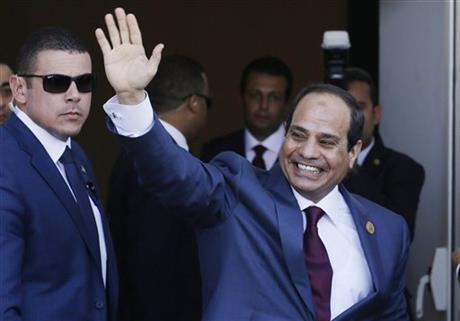
By BRIAN ROHAN
Egypt’s sweeping new counterterrorism law erodes basic rights and defines terrorism so broadly that it could encompass civil disobedience and be used to stifle dissent, Human Rights Watch said Wednesday in a scathing report.
The New York-based group says the law, passed by President Abdel-Fattah el-Sissi last weekend, gives prosecutors greater power to detain suspects without judicial review and order wide-ranging and potentially indefinite surveillance of terror suspects without a court order.
“Egypt’s president has taken a big step toward enshrining a permanent state of emergency as the law of the land,” said Nadim Houry, deputy Middle East and North Africa director at Human Rights Watch. “The government has equipped itself with even greater powers to continue stamping out its critics and opponents under its vague and ever-expanding war on terrorism.”
El-Sissi, who passed the law and dozens of others in the absence of parliament, has led a harsh crackdown on Islamists and other opponents since 2013, when he led the military overthrow of the Islamist Mohammed Morsi, the country’s divisive first freely elected president.
Following Morsi’s ouster, a long-running insurgency in the Sinai Peninsula surged, with stepped-up attacks targeting the military there and on the mainland. The most potent armed group in Sinai pledged allegiance to the Islamic State group last year.
The ant-terrorism law was finalized amid a wave of attacks and killings this summer, including the assassination of Egypt’s attorney general by a car bomb in Cairo.
That violence continued early Thursday, when security officials said a large bomb exploded near a national security building in Cairo’s Shubra neighborhood, injuring six. There were no immediate reports of injuries or fatalities.
Egypt’s Foreign Ministry said in a statement that it would release a note explaining the law, in English and Arabic, in response to some of the criticism.
In Washington on Tuesday, State Department spokesman John Kirby said that the United States stands with Egypt in its fight against terrorism, but that the law raised some concerns, pointing out the U.S. position that those who disagree with the government’s policies should be allowed to express their views peacefully and through participation in the political process.
“Egypt’s new anti-terrorism law could have a significant detrimental impact on human rights and fundamental freedoms, including due process safeguards, freedom of association, and freedom of expression,” he told reporters at a regular press briefing.
Egyptians lived under so-called “emergency laws” for decades that gave police extensive powers, encouraging a culture of excess and brutality among security forces, something that partially inspired the 2011 uprising against longtime autocrat Hosni Mubarak. The emergency laws expired after his overthrow.
“The Egyptian government faces a serious and deadly insurgency,” Houry said. “But eroding basic rights, curtailing dissent, and using ‘terrorism’ as a cudgel against opponents is no way to win the battle for hearts and minds.”
In its report, Human Rights Watch said the new law far exceeds the U.N.’s definition of terrorism is an act committed with the intent to kill, cause serious bodily injury, or take hostages with the aim of intimidating or terrorizing a population or compelling a government or international organization.
It also said the law runs counter to basic legal principles that require legislation to be precisely drafted and understandable as a safeguard against arbitrary use and so that people know what actions constitute a crime.
It noted the law’s wide reach in criminalizing private, ineffectual incitement and by linking that incitement to a definition of terrorism that includes using force or threats to “disrupt general order” or “harm national unity,” which could conceivably include civil disobedience.
In its crackdown on Morsi’s Muslim Brotherhood group, Egypt has prosecuted many of its members on terrorism charges for engaging in sit-ins or blocking roads during protests. Under the new law, anyone who privately urges another to participate in such actions could face prosecution.



